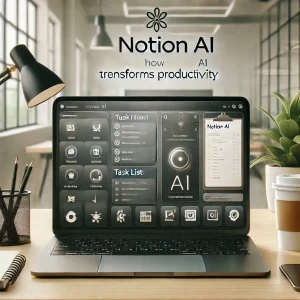AI Breakthroughs in 2024: The Most Important Developments You Need to Know
As we advance through 2024, artificial intelligence (AI) is making significant strides that impact various industries and shape the future of technology. Staying updated with these breakthroughs is crucial. This post will explore the most important AI advancements of the year, emerging trends, and their implications across different sectors.
Major AI Breakthroughs of 2024
Advanced Natural Language Processing (NLP)
Natural Language Processing (NLP) has seen remarkable improvements in 2024. Modern NLP models are now more accurate and context-aware. For instance, newer models like GPT-4 offer better language comprehension and generate more coherent responses.
This advancement enhances conversational AI systems, such as virtual assistants and chatbots. Consequently, businesses can engage in more personalized interactions with customers. As a result, user satisfaction and operational efficiency are both improved.
AI in Healthcare: New Frontiers
AI’s role in healthcare has become increasingly impactful. AI-driven tools are now better at analyzing medical data, including imaging and genomics. These tools can detect diseases like cancer and neurological disorders with greater accuracy and speed.
For example, advanced algorithms can now spot anomalies in medical images that might be missed by human eyes. Moreover, AI is revolutionizing personalized medicine by tailoring treatments to individual genetic profiles. This leads to more precise diagnoses and effective treatment plans.
AI for Autonomous Systems
Autonomous systems, including self-driving cars and robotics, have made notable advancements in 2024. AI technologies now enable these systems to navigate complex environments more safely and reliably. Enhanced sensors and algorithms allow real-time decision-making, which improves safety.
In robotics, AI has made machines more versatile and capable. From industrial robots to home assistants, AI-driven systems perform a wide range of tasks, boosting productivity and convenience. These advancements pave the way for broader adoption of autonomous systems in various sectors.
Emerging Trends and Technologies
AI and Quantum Computing Integration
A significant development in AI is its integration with quantum computing. Quantum computers perform complex calculations at unprecedented speeds. When combined with AI, they enhance the performance of machine learning algorithms, solving problems previously out of reach.
This synergy holds promise for fields like cryptography and optimization. For instance, quantum-enhanced AI could accelerate drug discovery and solve complex logistical issues. As quantum computing evolves, its integration with AI will drive groundbreaking innovations.
Ethical AI: Balancing Innovation with Responsibility
Ethical considerations in AI are increasingly important. Advances in AI raise concerns about bias, transparency, and accountability. In 2024, there is a strong focus on developing ethical AI frameworks to address these issues.
Efforts are underway to mitigate algorithmic biases and ensure transparency in AI decision-making. Implementing responsible AI practices involves continuous monitoring and adherence to ethical standards, ensuring AI systems benefit society while minimizing risks.
AI in Creative Industries
AI’s influence on creative industries has grown. AI algorithms now generate art, music, and design with impressive results. These technologies assist artists and designers by providing new tools for creation.
For example, AI-driven tools can generate unique designs and compositions based on user inputs. Although AI-generated content offers exciting possibilities, it also raises questions about creativity and authorship. Balancing these aspects is crucial as AI continues to contribute to creative fields.
Implications for Various Industries
AI in Finance and Business
AI is transforming finance by enhancing financial analysis and decision-making. Advanced algorithms analyze vast data sets to identify trends, optimize investments, and manage risks. These capabilities improve fraud detection and customer service within the financial sector.
Businesses are also benefiting from AI, which streamlines operations and enhances decision-making. AI tools analyze market trends and customer behavior, leading to more informed strategies and improved performance. The integration of AI fosters data-driven decisions and operational efficiency.
AI in Education and Training
In education, AI provides personalized learning experiences. AI-driven tools adapt to individual learning styles, offering tailored recommendations and feedback. This approach enhances the learning process and helps students achieve their goals.
For training and development, AI creates immersive programs that simulate real-world scenarios. These AI-powered solutions allow learners to practice skills in a controlled environment, improving the effectiveness of training programs. The result is better preparation for professional challenges.
AI in Consumer Technology
Consumer technology has advanced due to AI innovations. AI-powered devices, such as smart home assistants and wearables, enhance user experiences. These technologies offer personalized recommendations and automate tasks, increasing convenience.
For instance, AI-driven smart home devices learn user preferences and manage home tasks. Similarly, recommendation systems analyze behavior to suggest relevant products or content. AI’s integration into consumer technology enhances everyday experiences and drives innovation.
Preparing for the Future of AI
Staying Ahead with AI Trends
To stay competitive, it is essential to keep up with AI trends. This involves monitoring advancements, attending industry events, and utilizing resources like research papers and reports. Staying informed helps individuals and organizations adapt to emerging technologies effectively.
Skills and Knowledge for AI Professionals
Working with AI requires a mix of technical skills and domain knowledge. Key skills include proficiency in machine learning algorithms, data analysis, and understanding AI ethics. Continuous learning and professional development are crucial for effectively applying AI technologies.

The Role of AI in Shaping Tomorrow’s Technology
AI is central to shaping future technology. As AI continues to advance, it will drive innovations across various fields. Embracing AI opportunities, addressing ethical concerns, and staying adaptable are vital for navigating this evolving landscape.
Conclusion
AI breakthroughs in 2024 are driving significant advancements across numerous sectors. From NLP and healthcare to autonomous systems and quantum computing, these developments are shaping the future of technology. Staying informed and adaptable will help individuals and organizations leverage AI’s transformative power effectively.














Post Comment